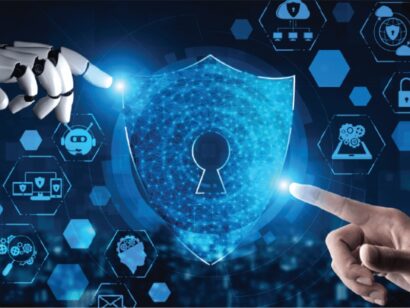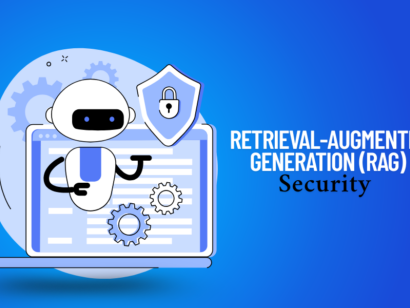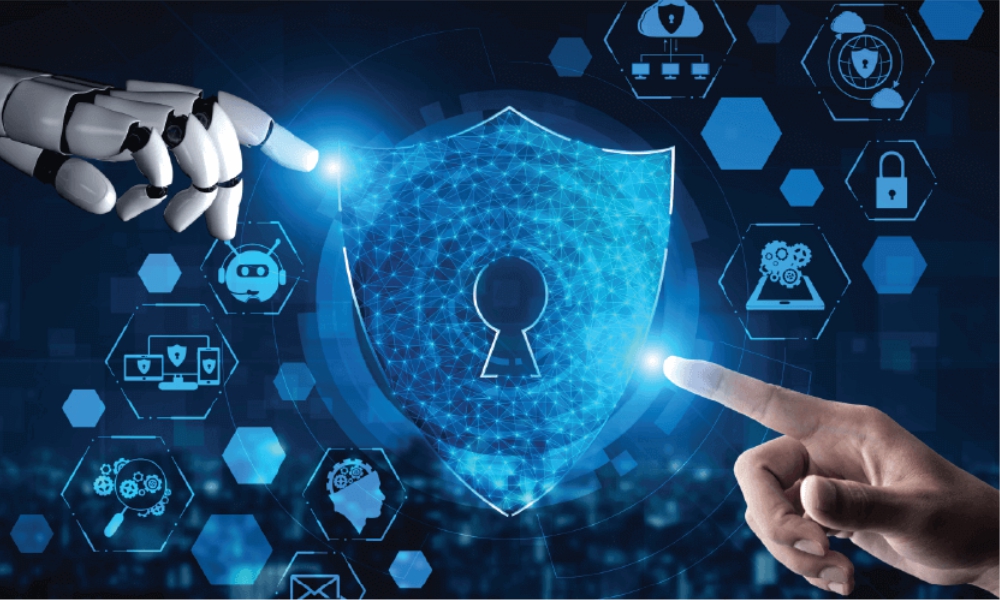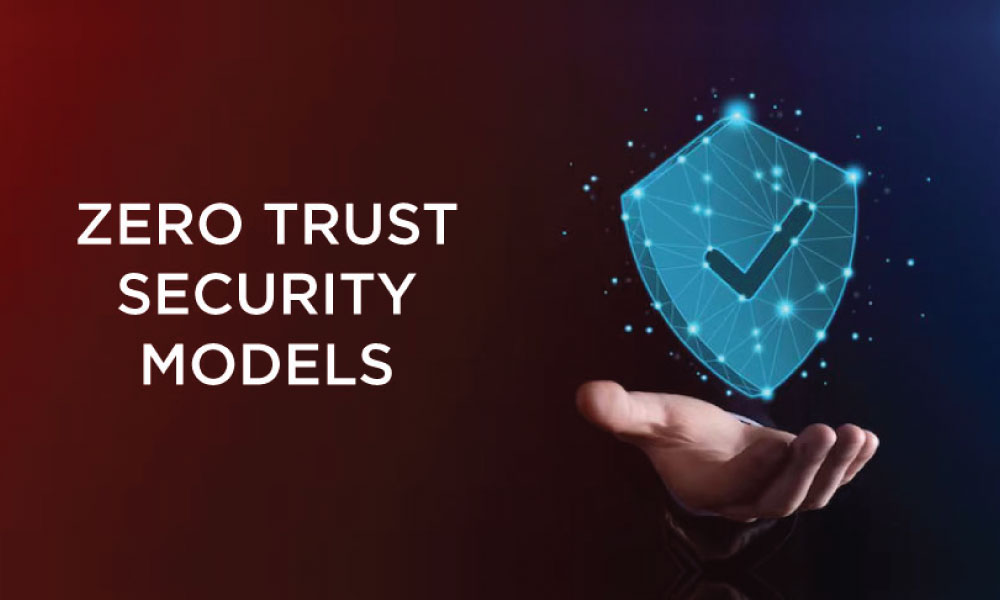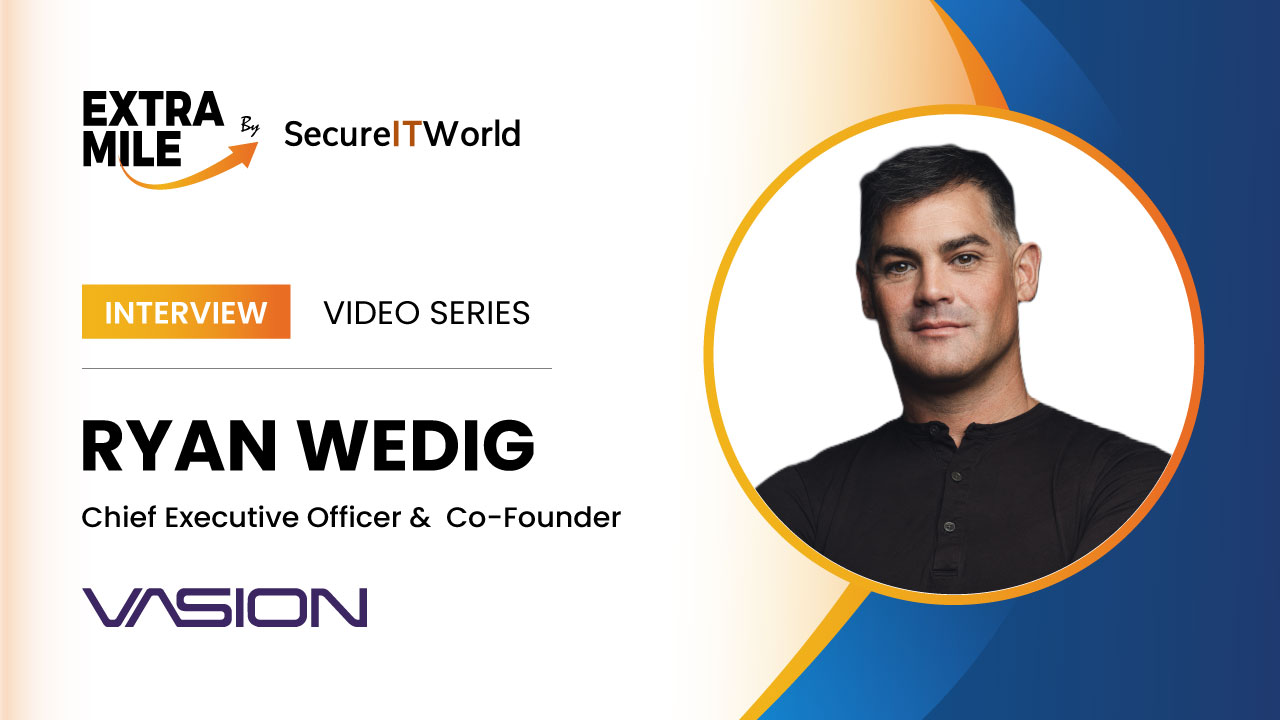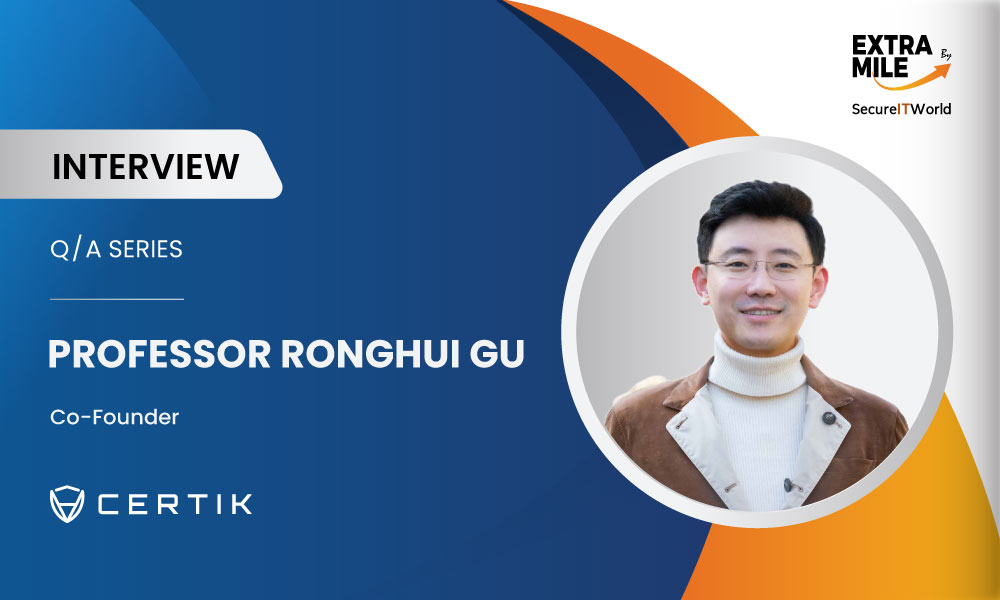Host: A warm welcome to everyone from ExtraMile by SecureITWorld, an exclusive interview series that imparts in-depth knowledge on technology and cybersecurity. I'm your host Sudakshina, and we are gathered here to explore the latest trends and practices in tech, cybersecurity and beyond.
We're delighted to introduce our guests for today's episode, Jesse Anglen, Co-Founder and Chief Executive Officer of Rapid Innovation, a blockchain, web3 and AI development firm.
With a team of more than 200 individuals and headquarters in the US and India, Rapid Innovation is supporting startups and entrepreneurs across the globe to thrive in competitive industry. Jesse has been an integral part of the establishment and success of Rapid Innovation.
Being a true AI and tech enthusiast, he believes that technologies like automation, blockchain, IoT, AR, and VR revolutionizes the way we see and legalize today.
Jesse's objective is to empower businesses by assisting them in unlocking the full competency of automation. Let us explore his expertise alongside attaining knowledge on groundbreaking innovations that can transform the commercial sector.
A very warm welcome, Jesse. We are excited to have you with us today.
Jesse: I am very excited to be here. Very nice to meet you.
Host: Same here. So, as someone who lives and breathes tech, how do you think technological advancement has transformed our day-to-day lives, simplifying critical tasks in professional settings and beyond?
Jesse: Well, that's a big question. So, I mean, lots and lots of ways. But I would say the ways that are most interesting to me would be when I look specifically at AI and generative AI, very specifically.
Because AI has been transforming businesses for a long time. People don't think about the fact that AI has been around 15 years in a pretty meaningful way, whether that be like autocorrect on your iPhone or Netflix suggestions or something along those lines. But generative AI, very specifically, has the opportunity to create arbitrage in value production.
And what I mean by that is that right now, the majority of value in the marketplace is created by humans, right? So, people do things, those things are worth something, and then the economy is stimulated, et cetera, et cetera. Well, what is going to happen with generative AI, agentic systems, digital labor is that there's going to be, basically, the creation of value is going to become incredibly efficient as far as what it costs to create something of value, i.e., you can build an agentic system or an agentic AI, and that agentic AI is going to cost very little compared to a person. But it will produce more value than a person could. It will also take the most valuable people with the best ideas, and it will maximize their ability to create value as well. And so, there's a really unique value creation arbitrage that is happening right now in the digital labor space, the agentic AI space.
So, that's what I'm most excited about. And I think that's what's going post-transformation.
Host: True. So, technological advancement is truly something that we cannot ignore today, since it has impacted our regular routine. So, moving ahead, what has been your inspiration for co-founding Rapid Innovation, and which industry gaps do you endeavor to fulfill by establishing this firm?
Jesse: Well, why I created Rapid Innovation, that's very simple. I have always been interested in improving the user experience of human beings. Probably for the last 20 years, I've been looking for ways to make human beings' lives better in some way, shape, or form.
And Rapid Innovation is really a way to leverage my ability to create a large impact, because we work specifically with startups and with people who are trying to make an impact. And so, I mean, that's kind of my why, why Rapid Innovation exists and where that came from. What was the second question?
Sorry, I took too long answering the first one. I forgot the second question.
Host: Which industry gaps did you endeavor to fill by establishing this firm?
Jesse: Yeah. So, the biggest gap that I saw when I first started Rapid Innovation, what I realized is there's a lot of development companies that focus on, I would say, that focus on legacy technology. And so, for instance, you know, whatever the newest technology was that people could use that would make a big impact, most development companies or development agencies were five years behind that or three years behind that.
And what I realized was that it was an entire segment of the market that wanted to use the newest cutting-edge technologies, whether that be blockchain technology back when I first started Rapid Innovation or the newest AI technology. And so, Rapid Innovation really was created to fill that gap and allow startups the ability to have access to, at a very highly competent level, access to the very newest technology that's on the market today and will be on the market in six months.
Host: Great. So, if you were ever asked to discuss the most impactful innovations that could influence different industries in the next couple of years, what technologies would you highlight and how might they redefine business models, workflows, dynamics, and global economic structures?
Jesse: She asked really big questions. I feel like we could spend an hour on that question, especially if we're looking at the next couple of decades. But kind of the teedy answer and probably the most currently viral entry, AGI or ASI.
So, for all of human history, when problems needed to be solved, human beings have solved. And there's a certain bottleneck or limitation to what human beings can do because we are restricted by time. We have to sleep sometimes and we're restricted by competency.
How many competent people exist? And we're restricted by, I guess, how do you even say that? Like the physical nature of human beings living in a physical world, right?
Like we need to eat, we can't be in places at once, there's only so much thinking we can do, et cetera, et cetera. When you're able to take any problem, doesn't matter what the problem is, and you're able to convert it into a math problem and then give that problem to a computer, what you see is exponential growth in whatever problem it is you're solving. So, the best example of this would be photography.
So, photography used to be a chemistry problem, right? If you go back 20 years, it's a bunch of pictures, you bring those pictures to a chemist, chemist developed the film, you had to know how to think about how to take pictures because it was, once again, it was a chemist problem, it was a chemistry problem. Well, one day someone figured out how to turn that chemistry problem into a math problem.
We now have digital photography. And the advancements that have happened to photography since the conversion from a chemistry problem to a math problem have been exponential. The thing that I am convinced of is that what we are doing is we are taking intelligence as an organic problem, right?
Human beings have a limiting back and we're turning intelligence into a math problem when it comes to the advancements we've made in AI in the last four years, five years. And I believe that when that happens, it is going to fundamentally change the lives of every single person on planet Earth. Problems we could not solve and that we have not solved for the last thousand years, those problems will be solved by AI.
And I believe that it will fundamentally change everything. It's going to change economics. It's going to change the way that people live their lives.
It's going to change. It's going to solve problems we did not even know we had, probably. So yeah, that'd be my answer to that question.
Host: Definitely. So, utilizing full potential of technologies like AI, ML, IoT, blockchain, and others will definitely be advantageous for businesses. So hence, shifting our focus to industry-specific benefits, how do you think Web3 and blockchain solutions can improve healthcare facilities and offer better services to people?
Jesse: So, one of the big problems in the healthcare industry specifically is the fragmentation of data. And so, I'll give you an example. If I was to go, if I go into a hospital tomorrow with a problem here in Goa, for instance, and they see me and they go and help me out.
And then I travel up to Delhi and something happens and I need to go to the hospital again. The hospital in Delhi has absolutely no idea what happened in Goa, right? Because there's no connection, right?
There's no like single source of truth that is who Jesse is and what's happened to Jesse.
Host: They don't have your data, yeah.
Jesse: Exactly. And I think that that's where blockchain is going to make one of the biggest, I mean, I think that is probably the biggest value proposition of blockchain beyond maybe the ownership of digital assets and some of the other things. The idea that in a private way that is secure, I can share my data with anyone who needs, like that is revolutionary.
But the idea that you could do that specifically in the medical field could fundamentally change the way that healthcare works. Because one of the most frustrating things, and a lot of things happen, because I get treated down here, I may, maybe I, maybe I forget what medication they've given me, maybe I forget what happened and I don't inform or I don't even know what to think about. I don't inform the doctors up in Delhi about this.
And then they give me a conflicting medication and it harms me. There are so many instances of that happening all around the world. And blockchain could just fix that because a distributed ledger allows anyone who needs access to that data to have access to that data.
So, in my mind, that's probably like the number one biggest impactful thing that blockchain could have.
Host: The healthcare industry is surely set to go through remarkable shifts in the upcoming years with major technological integrations. Hence, we can move to our next question, cryptocurrency. Cryptocurrency is a key component to digital economy. What opportunities does it create? And might it reshape the traditional economic system?
Jesse: I mean, short answer is, yeah, it's gonna have, it's gonna have some sort of an effect. Really, if you think about if you think about cryptocurrencies, or I mean, even go back and think about fiat, right? So, governments create this, this technology, if you want to think about it in that sense.
And that technology deals with the double coincidence of wants problem and solves it, right? If you want a cow, and I want a sheep, you know, like, we can we now can use this technology that we call fiat. And, and we can do an exchange.
And you don't have to want what I'm selling. I don't have to want what you're want to sell what you're buying. So, we can do it, and so that was a great advancement for how we just dealt with barter, like, how do I get rid of the things I don't want?
How do I how do I get the things I do want? The thing that cryptocurrency has the potential to do is it has the potential to fulfill that fundamental purpose of what why fiat is right, like it can it can continue to solve the double coincidence of wants problem. But at the same time, because of the nature of smart contracts, because of the programmable money, right money that you can, you can assign rules to and tell it, hey, I want you to work this way, but not work that way.
Because of that innovation in, in the, in the blockchain space, I think that we could do a lot of things with fiat. Number one, I think we can get rid of all the fractured fiat that exists throughout the world. In theory, if you wanted to go with some sort of global system that work, even if you don't want to do that, you want to go in and out of, you know, government regulated fiat currencies, which will probably be a thing for a very, very long time, you still have the ability to move value from one place to another place, which is something that's very hard to do.
Like most people don't realize if I want, if I want to take money from the United States and bring it to India, I literally have to take my physical money out of a bank account, I have to put it in boxes, and I have to put it on an airplane. And I have to fly it over here, because I can't wire large amounts of money from the United States, India without all kinds of problems, right? So, they move the money physically in boxes.
And the ability to take and instantly transact with any place in the world and move value from one place to another place would have, I mean, massive impacts on economies, on the ability for certain economies to grow where they currently are. And so that's how I see cryptocurrency probably having the largest impact. There's more, I mean, you could probably have an entire podcast on this subject.
But in my mind, that's number one.
Host: Great. So, you have redefined the crucial aspects that will redefine the idea of digital economy. Moving farther, security threats are advancing continuously for individuals and businesses. Do you think blockchain technology can eliminate prevalent cybersecurity concerns?
Jesse: Eliminate? No, I don't think the blockchain can eliminate cybersecurity concerns. What I think it does is this.
Anytime that you can segregate data, you can have everyone's data at different places. It makes it incredibly counterproductive for a hacker to go in and take people's data, right? If I take a bunch of really valuable data, and I stick it in one box, then all of a sudden, everyone wants to go and try to figure out how to open that box.
But if I take a million people's really, really valuable data, and I put it in boxes, like nobody wants to do all that work to go through and figure out how to open up a million different boxes, right? They want to find the one box. And I think that's one of the ways that you will see specifically, decentralized security start to change things.
Because at the end of the day, if you self custody your own security, meaning I actually own my own, and a million other people own their own, then what ends up happening is anybody who wants to have my stuff, they have to come get my stuff, right? And then they have to go get the next person's stuff and the next person's stuff. And it's just not worth it.
And so, I think that that's one of the factors. I think that I've been in the blockchain space for a very long time, since like 2011. And one of the things that I have realized that although there are many, many security benefits, in a sense with distributed ledger technology, and some of how you can do trustless transactions, and things along those lines, you're never going to eliminate entirely the motivation for bad people to want to do bad things or get more stuff.
Like those people are going to do that. And there's always going to be a target somewhere. And there's always going to be smart to figure out how to, you know, how to think in advance.
But I do think it will help a great deal. And I think it is helpful in some aspects.
Host: So, staying aligned with the latest technologies will always contribute to building solid security frameworks. So, AI automation is doubtlessly streamlining critical business workloads. However, it also comes with specific limitations, such as inaccurate data analysis, privacy concerns.
How do we overcome these difficulties to successfully implement AI automation?
Jesse: I mean, have you seen Manus, I think is the name of it. It's a brand-new agency that just came out. It's absolutely mind blowing, that one does.
What I've realized is that about every four or five days, the technology behind agentic frameworks gets better. And so, some of it is you just spend more time working on the problem. And eventually, we will solve it well enough that it will work.
It's kind of a lazy answer. But some of that is actually true, because I've seen it happen. The agentic systems that I was building three years ago are garbage compared to the agentic systems that I'm building today.
And I bet you, if you and I were to have a conversation three years today, I would tell you the agentic systems that I was building three years ago are garbage. Even though today, they're pretty awesome. And so I mean, some of it's just going to be time and people working on this problem, because there's a bunch of highly, highly motivated people specifically working on trying to figure out how to make agentic systems really, really good.
Because labor, like, if you just look at the labor market in the world, it is trillions, trillions, and trillions of dollars. And if you solve that problem, it is worth I mean, the value creation is, I don't think our minds really understand what it could do for the world as a whole. So there's a lot of people highly motivated.
What I do know as well is that if you build agentic systems correctly, even today, you can get accuracy that is far superior to what human beings can do. And so I think that the answer to your question would almost be, we're there, it's done right. We have work to do.
And we do need to do that work. But with certain tasks, and certain automation, I think that we are almost there. How do you make it better?
I mean, at the end of the day, you just continue to improve the underlying technology. So as we make the large language models better, as we make the infrastructure that runs those large language models better, then we begin this process of making the end result technology, which would be the agentic systems, we make them better, you know, things like, I know that they're playing around with diffusion, large language models.
So, instead of just token generation, they're actually trying to diffuse the answer, which means that the actual number of tokens used to create an output is, I think, 10 times less than in like a traditional sequencer, where you're generating tokens in a sequence, you know, even like that improvement that came out yesterday, or a couple days ago, like, and that research paper that fundamentally changes how you can do things, because all of a sudden, now we can generate 10 times more tokens for the same cost, and wouldn't generate more tokens for more accurate results.
And so, it's a little bit of a lazy answer. But I think that time really is what fixes this problem, because there's a lot of work on the problem.
Host: So effective implementation of AI automation requires identification and mitigation of key challenges. So that was a lot of technical questions. So, moving ahead.
So last question, if you were ever given a chance to choose a different career option, apart from being a successful entrepreneur, what would it be? And why?
Jesse: You know what, no one's ever asked me that ever in my whole life. You're the first person to ever ask.
Host: I should feel lucky about that.
Jesse: Yeah, what an interesting question. If I was going to do something other than be an entrepreneur, what would I do? No, I have a very strange answer, I think, to this question, because I do know what I would I do know what I would do.
But it's very strange. I'd be a farmer. I love to watch things grow.
Part of the reason that I love being an entrepreneur is because when you when you when you work on a business, right, you put effort into it, you watch a business go from this little tiny enough like a seed, and it grows into something really, really big. Yeah, right. And sometimes it grows into something beautiful.
And you have this, this kind of effect as you water it and take care of it and all these things. And I'm and I've been always very, very fascinated with like, you know, going out and planting my garden and what grow and you get this reward doing that. And so oddly, I think that if I was not an entrepreneur in the tech space, I'd be a farmer.
Host: Very innovative, inspiring. I wasn't really expecting that answer. But yeah, it was really inspiring.
So that's really fascinating. It's always interesting to see how passions can connect across different fields. We're very thankful to you, Jesse, for joining and sharing your valuable insights with us today.
It's truly been a pleasure to have you with us.
Jesse: Hey, thank you for having me. It was fun. Yes, good question. Some that I have not been asked before.
Host: It is really great to have you with us.
Jesse: Awesome. Thank you for having me.
Host: Okay. Yeah. Okay.
Thank you everyone for tuning into this episode of ExtraMile by SecureITWorld. I'm your host Sudhakshina, signing off for today. Stay tuned for more insightful episodes with industry leaders.
Until then, keep exploring and keep learning. Stay tuned.
Explore Our Other Insightful Interview:
Safeguarding Organizational Assets with Passwordless and Biometric Authentication Ft. Mikel Sánchez, Global Sales Engineering Director of Veridas | Ep. 2



